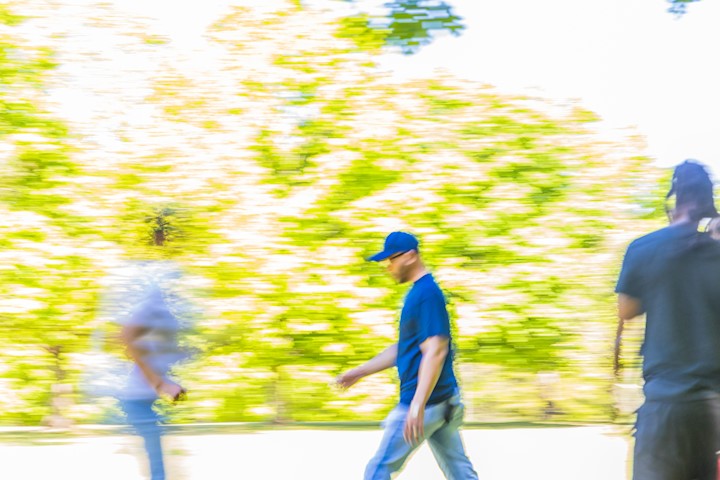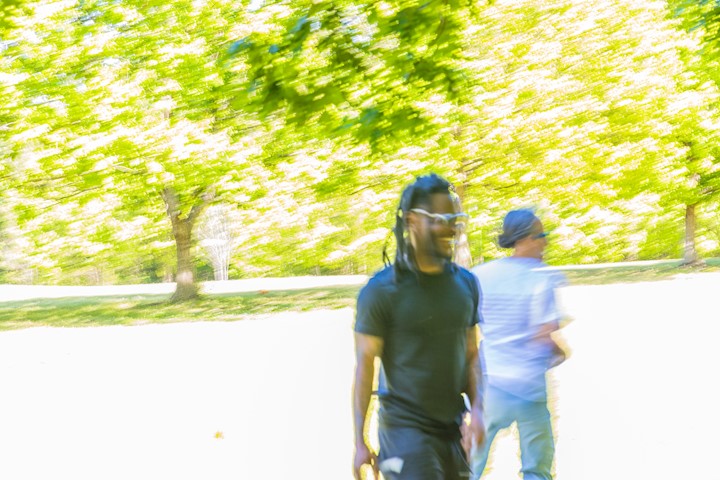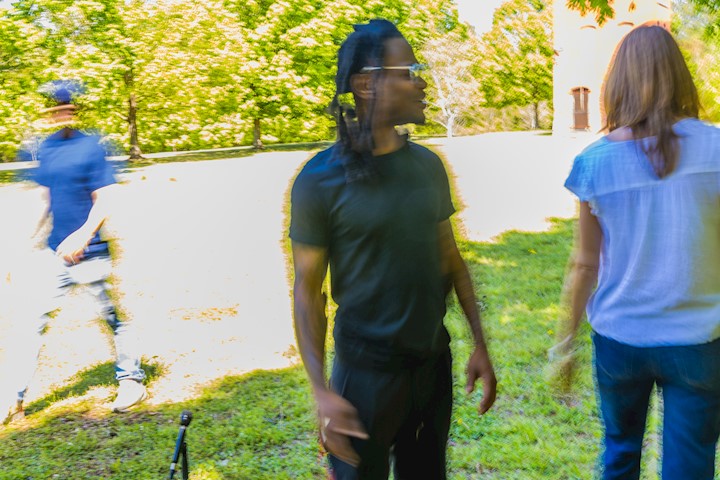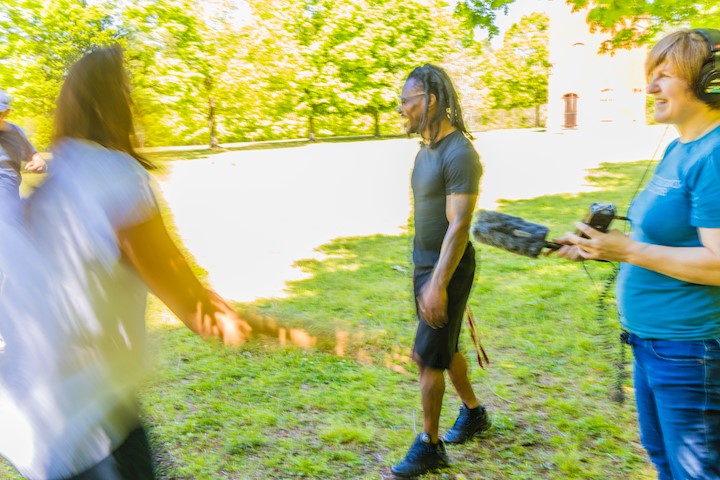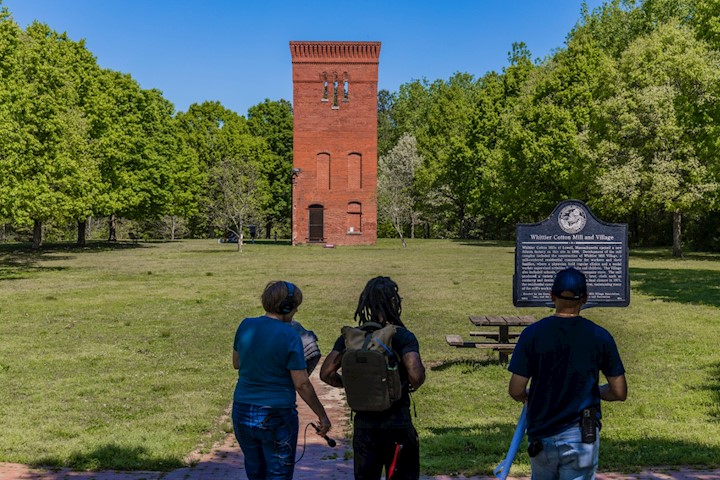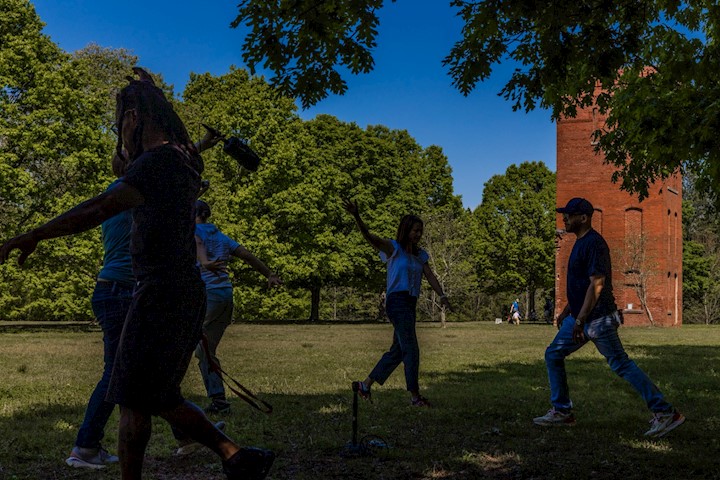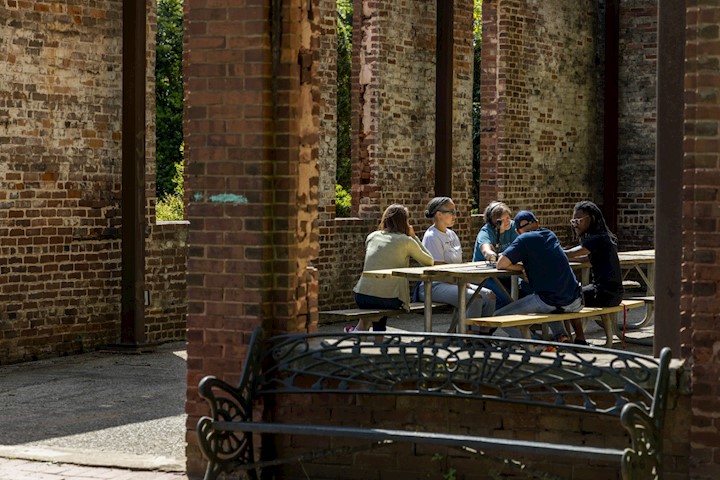
“Citizen Greeting | Rite of Return” is a sound-based, site-specific docu-poem about the reunion and reacquaintance of three formerly incarcerated men and three of the professors who taught them before their return. It unfolds in three chapters: “Greetings,” “The Hearing,” and “Walking On.”
Please note: the recorded conversation offers its share of laughter and joy, but it also references historical and present-day violence. Listen with caution and care.
We six humans first encountered each other in the classroom of a Georgia Department of Corrections (GDC) facility at the southeast Atlanta prison campus in the winter and spring of 2019. Lauren Neefe and Ruthie Yow were teaching linked literature and composition courses on, respectively, “The Sounds of Power” and “Composing Citizenship.” These courses were part of a new curriculum in the facility, and Muhammad Ahmad Abdus-Salaam, Dominique Harris, and Derrick Pitts were three of the first cohort of students to sign up and take the series of courses.
At the time, Julie B. Johnson was co-directing The Georgia Incarceration Performance Project with Amma Y. Ghartey-Tagoe Kootin, Emily Sahakian, and Keith Bolden in collaboration with University of Georgia and Spelman librarians, archivists, students, and community partners. The artistic directors invited the GDC students in our courses to contribute their work to the archive that would inform the Performance Project, so we invited Julie and Amma to visit the class, share the details of the project, and lead a movement workshop. Preston Townsend, mentioned by Dominique in the poem—they were cellies—was among those who contributed his work. He returned soon enough to attend the final performance of the Georgia Incarceration Performance Project at Spelman College in 2019 with his mother. They received a standing ovation.
Before that performance, at the conclusion of our courses, we composed a letter. In the spirit of the final assignment, which required the students to compose a collage about the sound of citizenship using quoted statements from their choice of course readings, the letter collages statements from the cover essays for their own portfolios:
Spring 2019
Dear Son, Sister, Enemy, Friend, Teacher, Pupil, God, and Lucifer, dear Fellow-Citizen,
Place your ear against something cool and flat. Let it hum for a moment. Let the silence fill and then dwindle. You don’t hear anything yet—not yet—but that conch-like rush of air, so close your eyes and see a classroom. See those uniforms with blue stripe, and skulls topped in kufis, arms wrapped in tattoos, some fresh and some faded, some bearded cheeks and smooth jaws—some of these men are much younger and much older than you would have imagined, before the men in this classroom began to populate your inner eye. These men are men. Maybe you also didn’t imagine that before you set yourself to listening and seeing. What’s this place, then? What are these cinder blocks and this wire beyond the window? The books, the sheaves of highlighters, name placards and dictionaries, the cups of coffee, the stray apple, the cellophane wrapped sandwich set just so at the top of the desk? In this classroom in your mind there are the trappings—faint, grubby, but there—of a class elsewhere—some distant purring city, some green late spring suburb. There are pencils moving over lined paper, and there are slow breaths, and palpable focus, like the settling of a bee on a door screen—peering in, bearing down. A delicate, fuzzed weight. A task being taken up, a notion being followed, fleshed out, held up, for collective engagement, for communal consideration. Now they are talking to and of one another—now they are passing their papers from hand to open hand—something is happening. It is this which you want to hear—believe me you want to hear it. You asked me about citizenship.
My Historical Self
“I recall the days out in fields picking cotton. I recall the police shootings and beatings in the city of August. I recall the many instances where the Ku Klux Klan marched in full regalia down Broad Street.” “What happened to the love?” “What did your skin color matter when your world consisted of the broken or unbroken, the scarred or unscarred, the loved or unloved?”
“They just traded the slave ships for buses, the slave owners for judges and guards, and plantations for prisons.” “Never met Mr. Crow but I feel his might / One school for negroes another for whites .… Blacks must go straight to the back / Get up if a white person wants where you sit at / All we want is equality but we don’t know where its hid at / Empty promises how the president can fix that / Why do we have to work for equality, but comes to whites bow-tied and gift-wrapped?”
“We want equal rights, no matter race, sex, ethnicity, or religion.” “These citizens recognize my truths, because they are factual, and applaud my courage because it is purposeful, and they realize the power we hold to provoke change. The counter sound will be the silence of guilt and manipulation.”
“I try to find my way through this political and racially divided world, which favors ‘Power’ over my ‘Rights’ as human being to live and be treated as equal as whites.” “A Citizen is only free conditionally and never literally.” “I decide who I am, I am not skin. I am not your expectations and degradations. I am not your stereotype, I am full of potential and life. Would I even have to articulate this if I were white? Mind of a menace.”
“Fellow citizens, pardon me, allow me to ask: why black people in America are expected to educate the world on being black?” “This is part of my historical self in these lines, [and] my ‘self-self’ because it’s coming from the heart.”
“In my understanding, the life of a person, the liberty of a person, and the happiness of a person can only come from the civility of a person.”
“What it is like to lose your citizenship in a country that is the so-called land of the free.”
Not Fixed or Final
“No one can hide from the truth once it is spoken.” “This is a statement not for the tender-hearted. This is a statement that’s not up for debate. This is a statement of truth which is self-evident and undeniable.” “Imagine the difference that could be made in any situation where prejudice is involved if the person who was the subject of prejudice was looked at as a family member instead of a spittoon.”
“Anguish is a language // everyone can speak but no one listens to it // I guess this is what // a prisoner of war camp is like / LIKE a painted Nubian Stop and Frisk // Dey did pear ter die but a // few ov’em cam out ag’in enis mixed // in mongs’ de yuthers…” “Do they even realize there is a fight they are currently in?” “The teachings of / Prison / will give everyone his due / I see the light at last / I’m for the morning dances / I salute the land / I listen.”
“This place is so dark. No it’s just my blackness. Blackness of my heart. No pulse, no beat, feeling of warmth inside as I feel nothing. Overwhelming silence because I couldn’t hear. My heart won’t beat. Why did I shoot, I wasn’t afraid? I taste something bitter and sweet.”
“You can make it in a broken society.”
“My journey is different from any other person in this world.”
“The concrete carpet laid out for all: Welcome to the Chain Gang.” “Every dog must have his day. Yes, and this is how I am a citizen.” “My answer is not fixed or final.”
“They don’t appear to understand that I am like them.” “The select few [police officers] make it hard on certain ‘citizens.’ Now I’m not sure what the future holds for these particular power abusers, but… ‘it will turn to their destruction—mark, then, the history of nations throughout the world.’”
When One Thinks of It
“I am not an animal.”
“The grander scale of hatred could be called patriotism.”
“There aren’t any viable options when one thinks of it.” “They don’t appear to understand that…I am a representation of America.” “We will end the conflict between law enforcement agencies who are meant to protect and serve our communities.”
“I met my new counselor who is a well-dressed, well-spoken black woman, who informed me that I need to fill out the proper paperwork to get my number approved. I use a blue pen this time.”
“You talk to your step brother’s girlfriend on the phone, and she says, ‘You sound black!’ Is black a sound?”
“Sound: the closing of my cell door in the . . . ”
“They often turned despair into hope.”
“We have bettered each other.”
In the five years since this letter commemorated our work together in that GDC classroom, many of the men who composed these lines have been released to return to “life outside,” Muhammad, Dominique, and Derrick among them. On March 24, 2024, six of us came “from our homes,” as Muhammad says in “Greetings,” and reunited by the playground near the pool at Grant Park: “a normal setting.” We reflected on the space we created for one another in that classroom, the meaning of sound on the inside, and the knowledge our bodies carry, express, and pass down. There we also made a plan to gather again three weeks later and restage the movement workshop Julie and Amma had led, this time at Whittier Mill Village Park.
The park is a significant place in the history of Atlanta after Reconstruction, because it welcomed Northern industrialization into the city by giving Whittier Mill a home and because that “business move” served the mutation of the plantation economy into a carceral economy. Just across the railroad tracks from the park is the abandoned site of Chattahoochee Brick Company, where the red-clay bricks that rebuilt Atlanta after the Civil War—including the textile mill—were made by hand by men, women, and children who had been reenslaved through the pernicious convict-leasing scheme. Within the city limits of today, the park is diametrically opposite the prison where we first met, all the better to reflect the rhyme of history.
On April 24, in the fullness of our humanity and with the fullest possible expression of our citizenship, we greeted one another again, we gave our history and experience a hearing, and we walked on. We hope our steps move us closer to reclaiming this place for the ancestors and the spirits who will call us ancestors. For sure we will meet again.
Our poem documents the justice in proximity. “‘You gotta rely on what you hear’…. ‘I can feel the wind’…. ‘Take that breath.’”
Julie’s history of Chattahoochee Brick Company and description of the conditions there were delivered off the cuff and may include minor errors. She is always quick and emphatic in crediting “the research of some amazing folks” who delved into archives, oral histories, and community wisdom to tell the more complete history of Atlanta, Chattahoochee Brick Company, and Whittier Mill Village. She has collected most of her resources here at Idle Crimes & Heavy Work (2020–23), a collaboration of Moving Our Stories with Tambra Omiyale Harris, Giwayen Mata, and a host of community visioners. Julie also shares that the movement activities we did in the prison and at the park were adapted and developed from improvisational exercises used by many dance practitioners before her. Walking/greeting exercises became an integral part of her practice with community after shadowing Rorie Smith, MFA, in a course called "Embodying Pluralism" at Temple University. On proximity and justice, look to Bryan Stevenson, Just Mercy, One World, 2015. On the almighty dap, look to Ta-Nehisi Coates from way back when: “The Sacred Art of Giving Dap,” The Atlantic, June 4, 2008. Thanks to Danielle Willkens for photographing our “rite of return” at Whittier Mill Village Park on April 24, 2024.
Works Cited
The following works are referenced specifically by title or author in “Citizen Greeting”:
Allan, Lewis (Abel Meeropol). “Strange Fruit.” Performance by Billie Holiday, Strange Fruit, Commodore, 1939.
“A New Cotton Mill.” The Atlanta Constitution [Atlanta, GA], 26 Apr. 1895, p. 5. Newspapers.com. Accessed 13 May 2024
“Causes of Arrest in Georgia.” Atlanta Police Department—Annual Report. 1896. Herbert T. Jenkins Papers. MSS 546, Box # 1, Folder # 2. Atlanta History Center, Atlanta, GA.
Davis, Angela Y. Are Prisons Obsolete? Seven Stories Press, 2003.
Hirose, Norman. “Norman I. Hirose Interview.” By Tom Ikeda, July 31, 2008. Courtesy of Topaz Museum Collection. Densho Digital Library, ddr.densho.org. May 11, 2024.
“Only Woman Blacksmith in America Is a Convict.”. The Atlanta Constitution [Atlanta, GA], 19 Aug. 1903, p. 4. Newspapers.com. Accessed 13 May 2024.
“Persons Arrested by Race and Sex.” Atlanta Police Department—Annual Report. 1903. Herbert T. Jenkins Papers. MSS 546, Box # 1, Folder # 3. Atlanta History Center, Atlanta, GA.
Philip, M. NourbeSe. “Discourse on the Logic of Language,” in She Tries Her Tongue, Her Silence Softly Breaks. 1989. Wesleyan University Press, 2015.
Rankine, Claudia. Citizen: An American Lyric. Graywolf Press, 2014.
